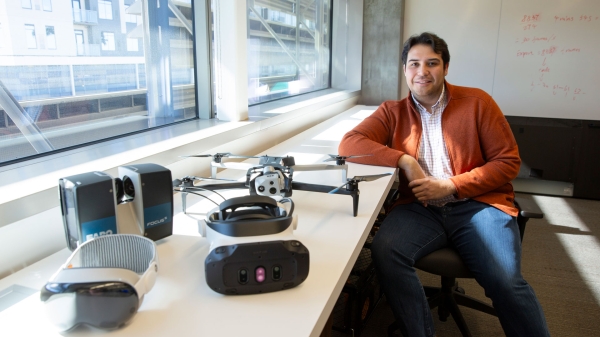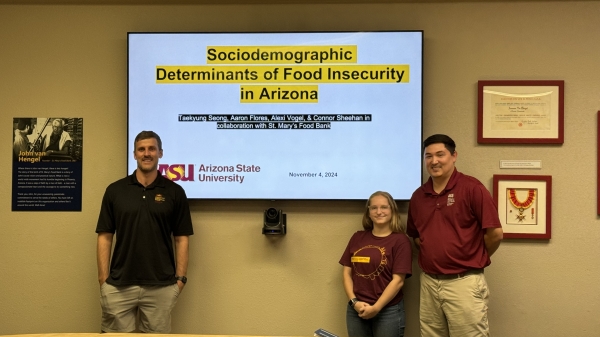Combating the opioid crisis with better equipped counselors

Each day, more than 1,000 Americans are treated in emergency rooms for opioid use, and more than 130 die from an overdose. Only 20% of the people who need rehabilitation receive treatment, and only a small fraction receive evidence-based rehabilitation.
Each day, more than 1,000 Americans are treated in emergency rooms for opioid use, and more than 130 die from an overdose. Only 20% of the people who need rehabilitation receive treatment, and only a small fraction receive evidence-based rehabilitation.
To meet the nationwide need for effective addiction rehabilitation, the Arizona State University Department of Psychology will launch an online training program that teaches evidence-based treatment strategies. The first session of the ASU Online Addiction and Substance Use Related Disorders Graduate Certificate will begin Aug. 22, 2019. Students who complete the seven-course certificate program will have the foundational knowledge required for licensure as an addictions counselor in Arizona and most other states.
“Most of the empirically validated treatments for substance abuse rehabilitation are not readily available, and our goal is to increase access to effective addiction treatments,” said Matthew Meier, assistant clinical professor of psychology. “We believe one way to do this is by teaching people who will be helping addicts about evidence-based treatment options.”
Each class in the program is based on the latest scientific research on addiction. Class topics include the psychobiology and neuroscience of addiction, multicultural issues associated with substance abuse and the ethics of substance abuse treatment.
Substance users can be addicted to more than one drug, and addiction is often accompanied by mental illness. The ASU Online Addiction and Substance Use Related Disorders Graduate Certificate addresses the complexity of substance abuse with classes that focus on the evidence-based options for the assessment of addiction and any accompanying mental disorders and research-based rehabilitation treatments.
According to the National Institute on Drug Abuse, one of the most effective evidence-based substance abuse treatments is contingency management. This method seeks to incentivize and reinforce behaviors in patients that promote sobriety. An example of contingency management is giving patients vouchers for each day of sobriety. The vouchers can then be exchanged for food and entertainment. Rehabilitation programs like this have been effective at treating both opioid and stimulant addiction in adults.
“There is widespread bias against contingency management,” Meier said, “but research has shown it is an effective intervention alone and works better than other approaches.”
Other examples of evidence-based rehabilitation treatments are medication assisted treatment and behavioral therapies like motivational interviewing and cognitive behavioral therapy. In medication assisted treatment, patients receive prescribed medications help treat the symptoms of withdrawal and decrease the likelihood of relapse due to cravings. In behavioral therapies, patients receive counseling to help them complete treatment. The certificate program will teach students about these and other validated rehabilitation interventions, so they are aware of the current state of research on drug addiction.
“Providing more up-to-date information about research in the field of substance abuse treatment is desperately needed,” Meier said. “There is also a huge need for well-trained substance abuse counselors, especially outside of metropolitan areas.”
Prospective students must have a bachelor’s degree in a behavioral health-related field, be enrolled in a behavioral health master’s degree or doctoral program or currently work as behavioral health professional. The U.S. Bureau of Labor and Statistics expects job opportunities for licensed substance abuse counselors to grow by 22% through 2026. Jobs for licensed substance abuse counselors are available in substance abuse treatment centers, community mental health agencies, primary care, integrated health, criminal justice, hospitals, schools, universities, the military and Veteran’s Affairs.
More Science and technology

Teaching construction realities with virtual environments
Visiting a construction site is a valuable learning opportunity for students who want to one day work in the industry.…
ASU, Mexico partner to build next generation of chipmakers, drive semiconductor innovation
Thousands of college students in Mexico will soon have the opportunity to enroll in Arizona State University’s new, free online…

ASU, St. Mary’s Food Bank partner to tackle food insecurity in Arizona
Arizona State University and St. Mary’s Food Bank (SMFB) have joined forces to create an interactive data dashboard that tracks…